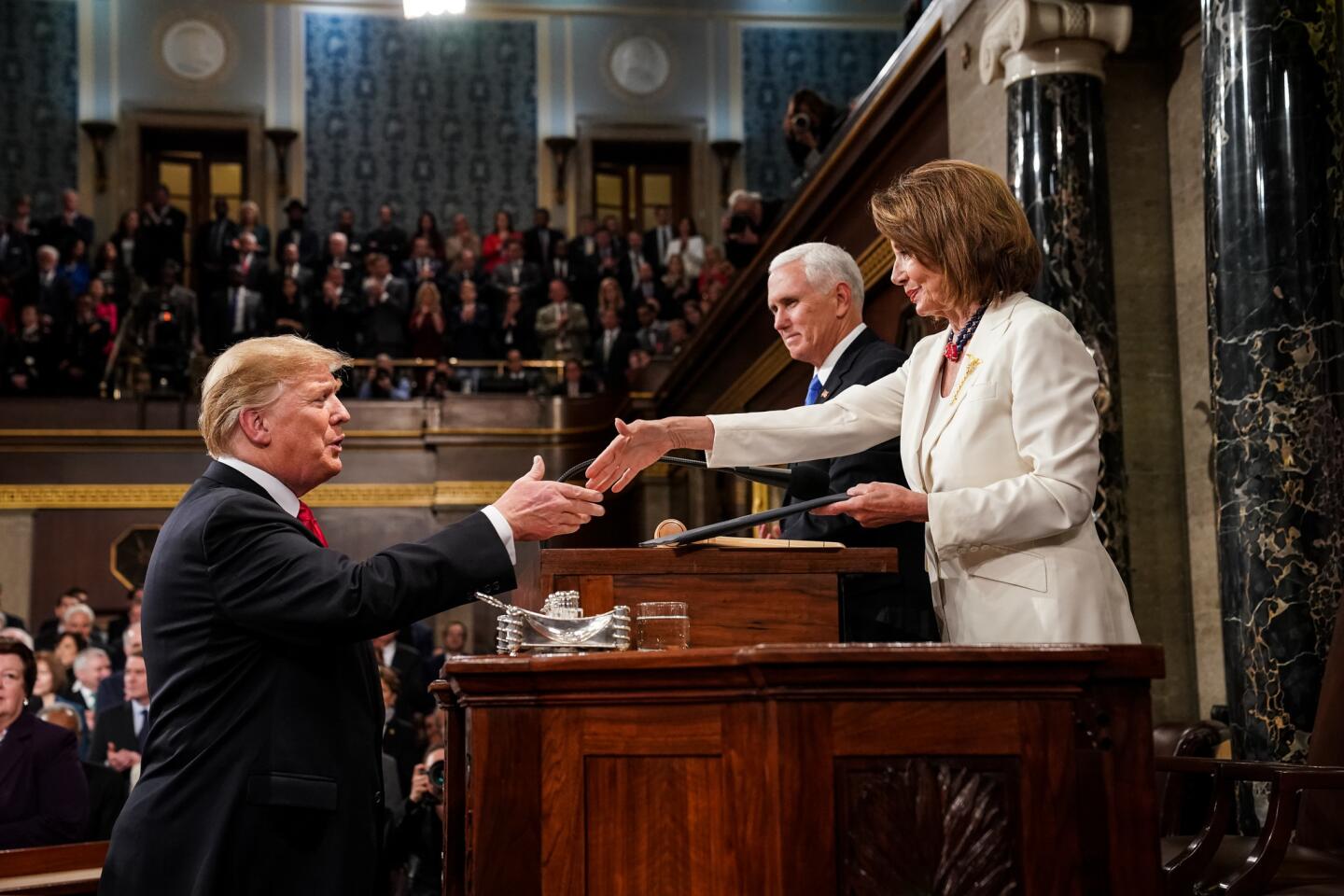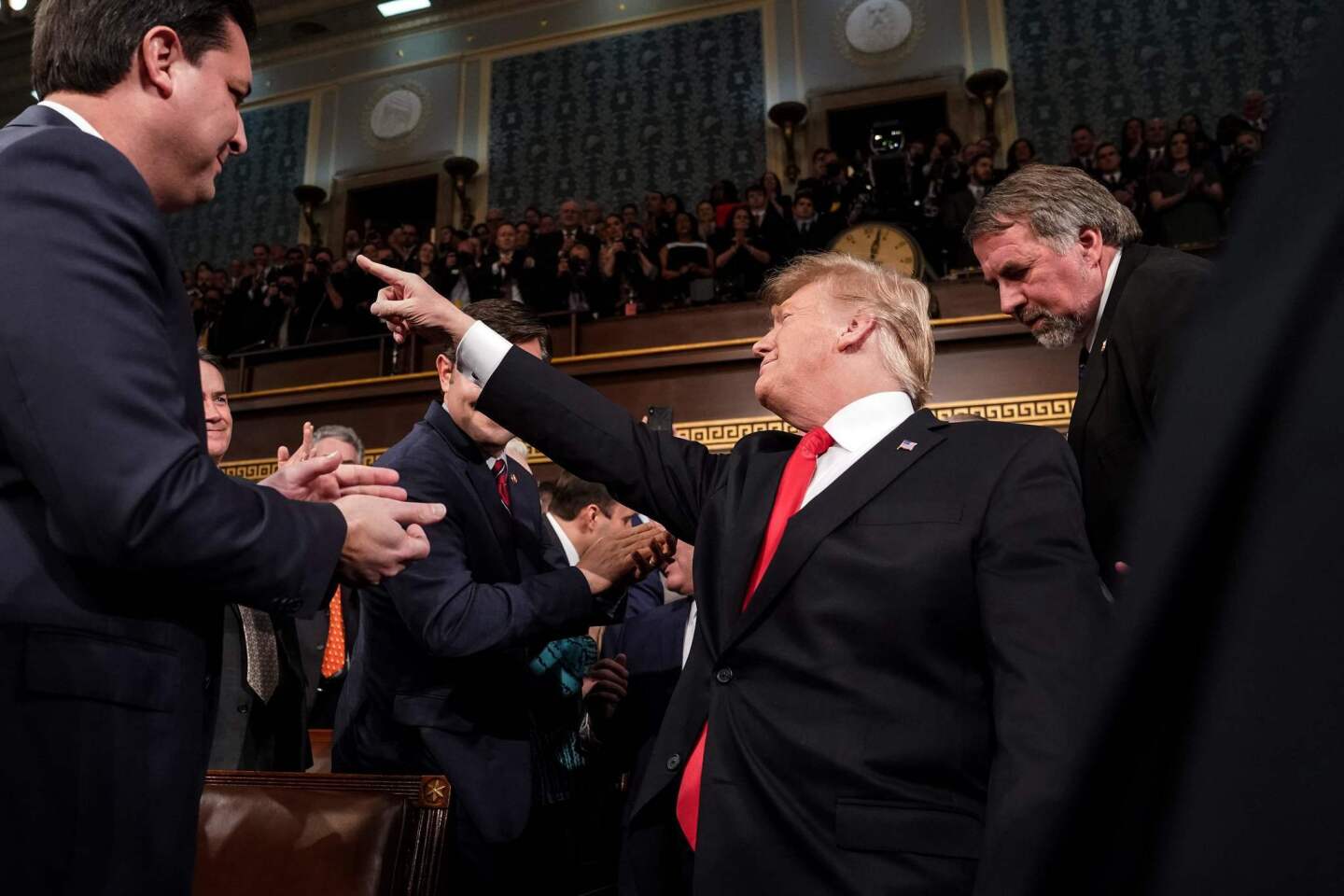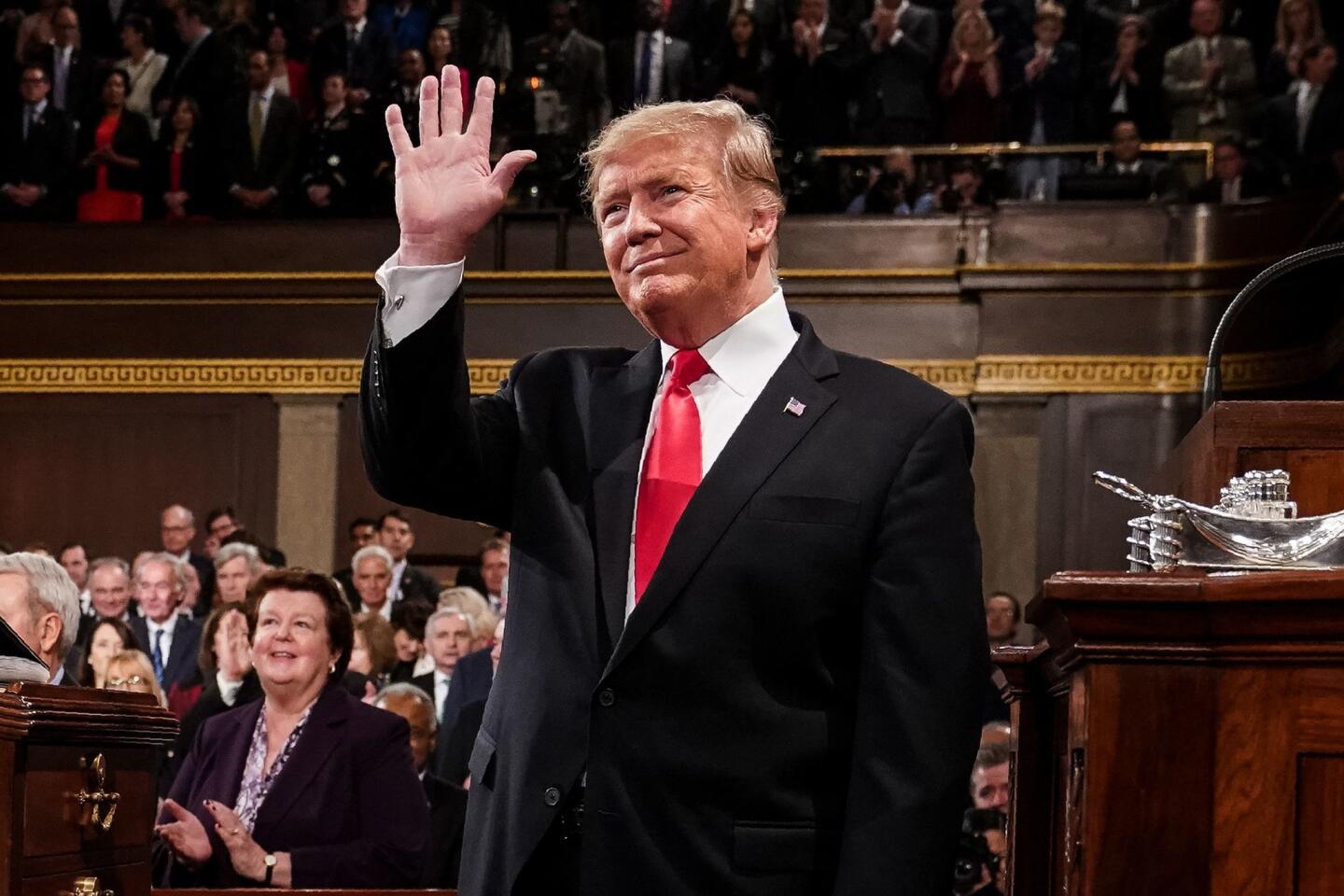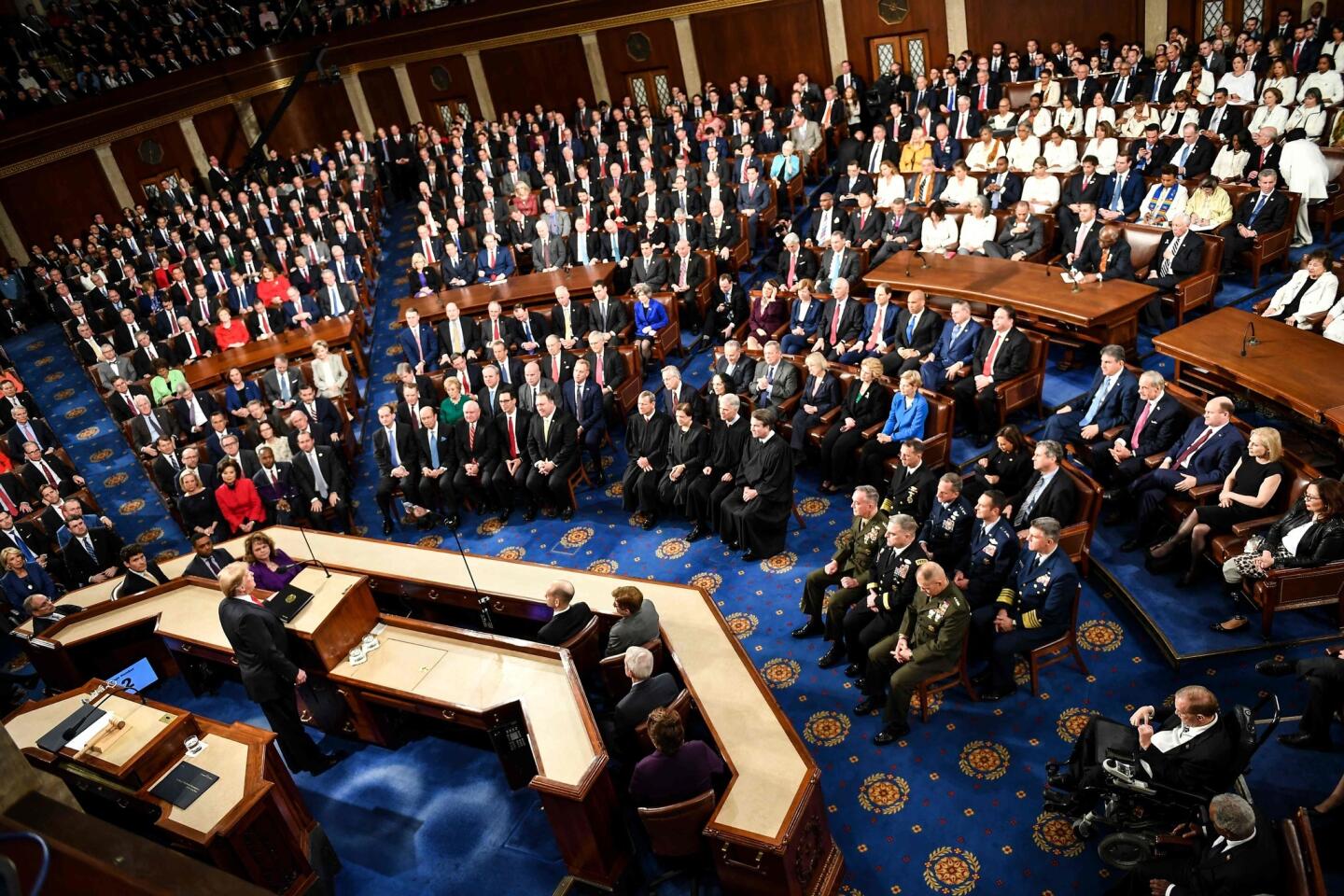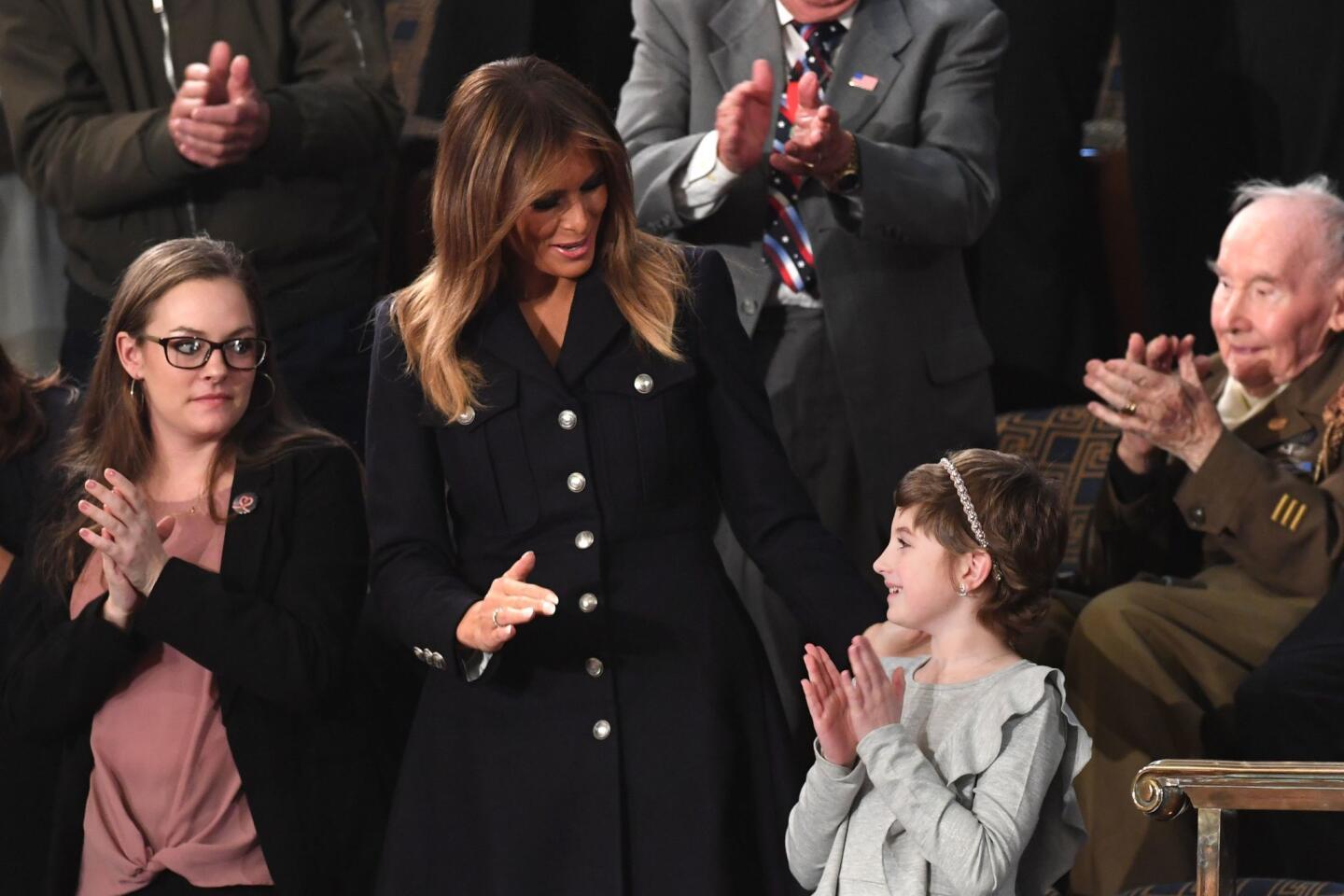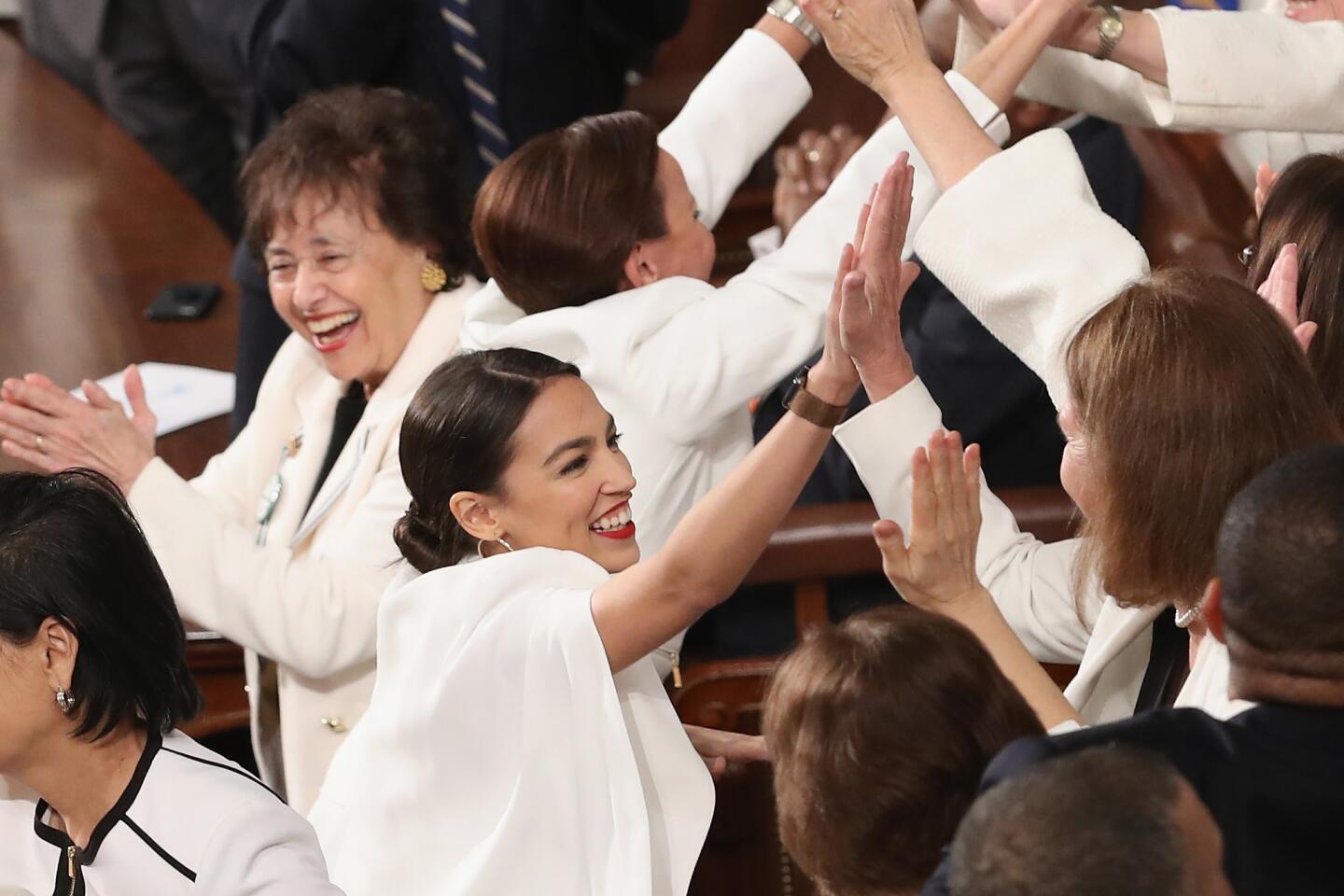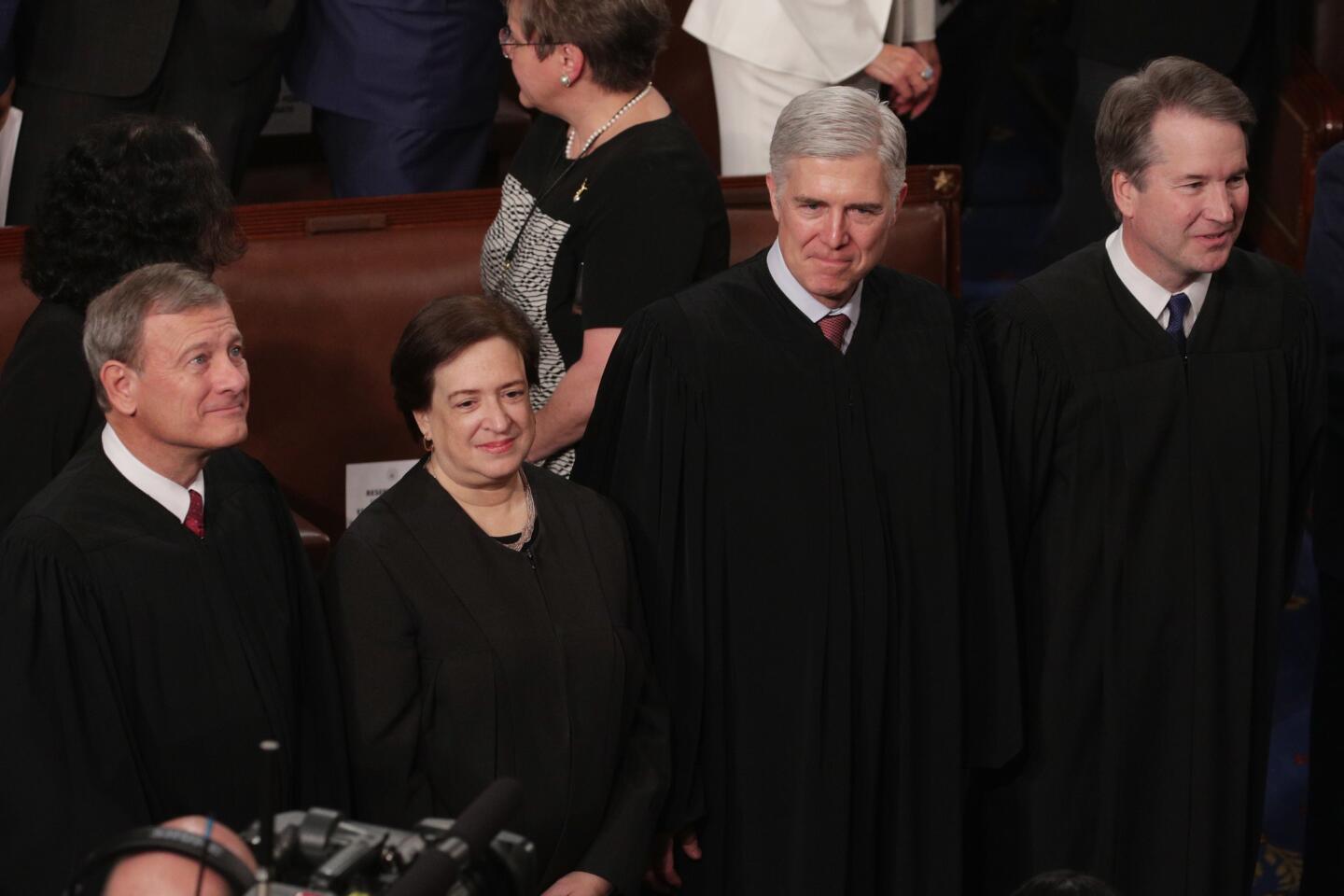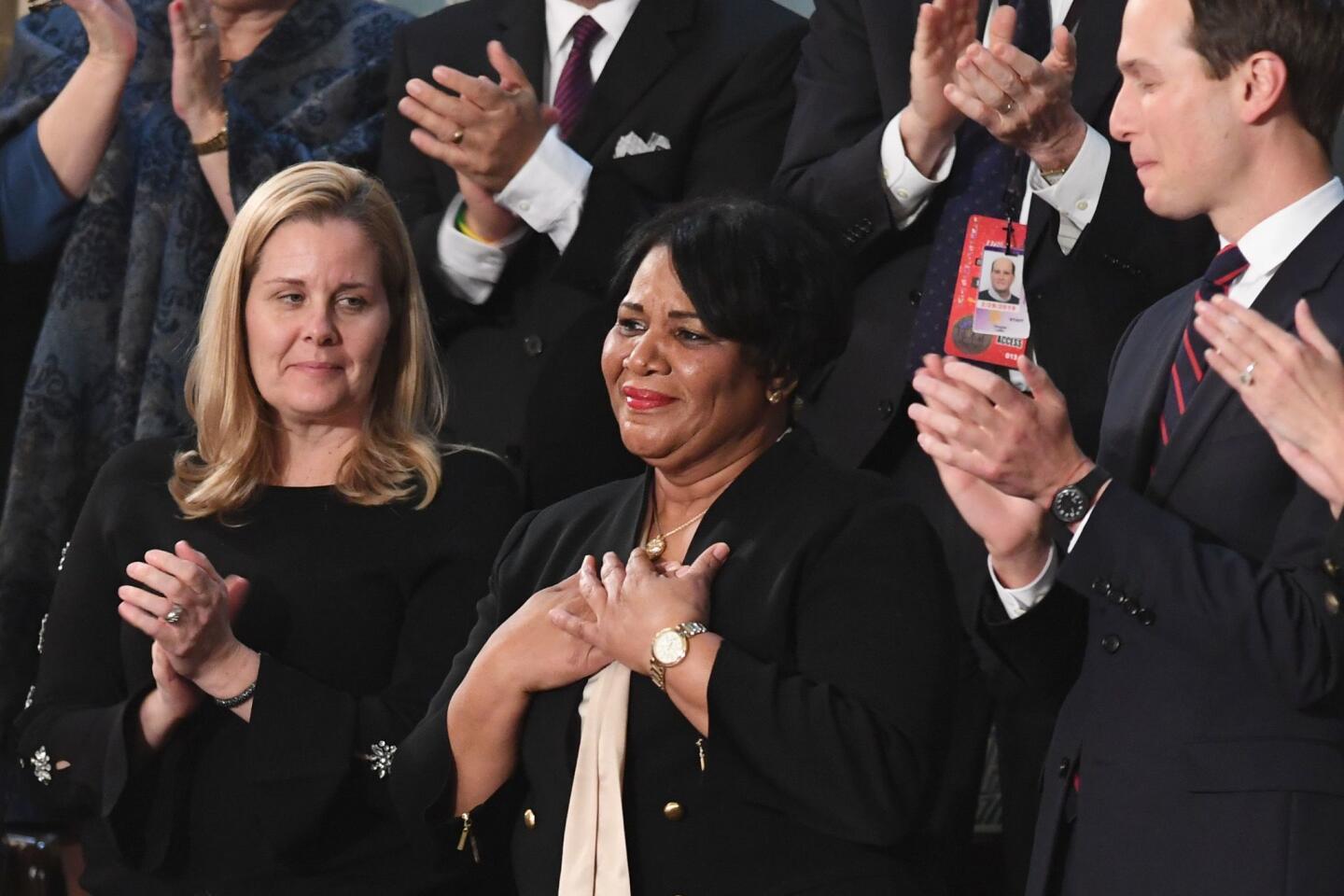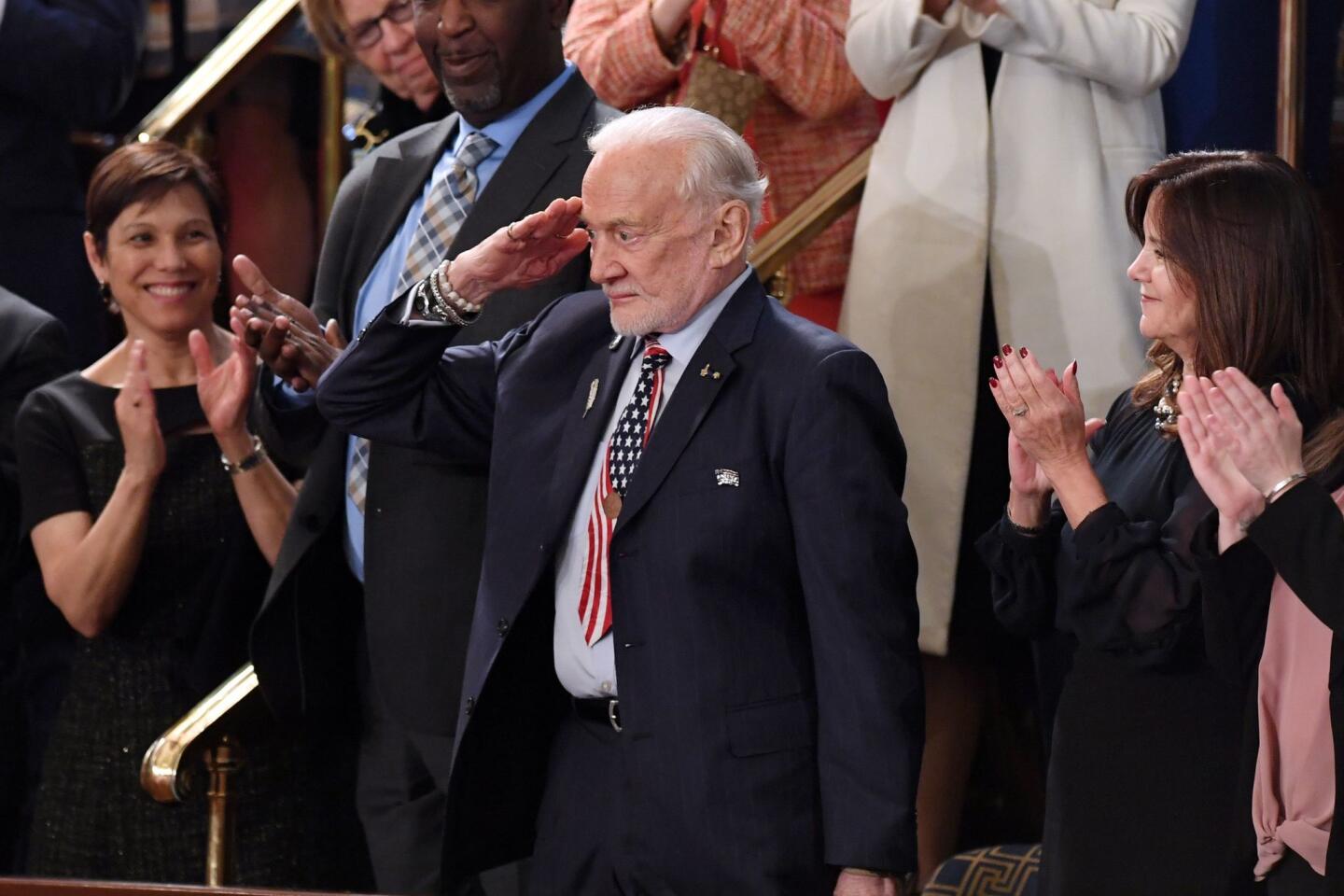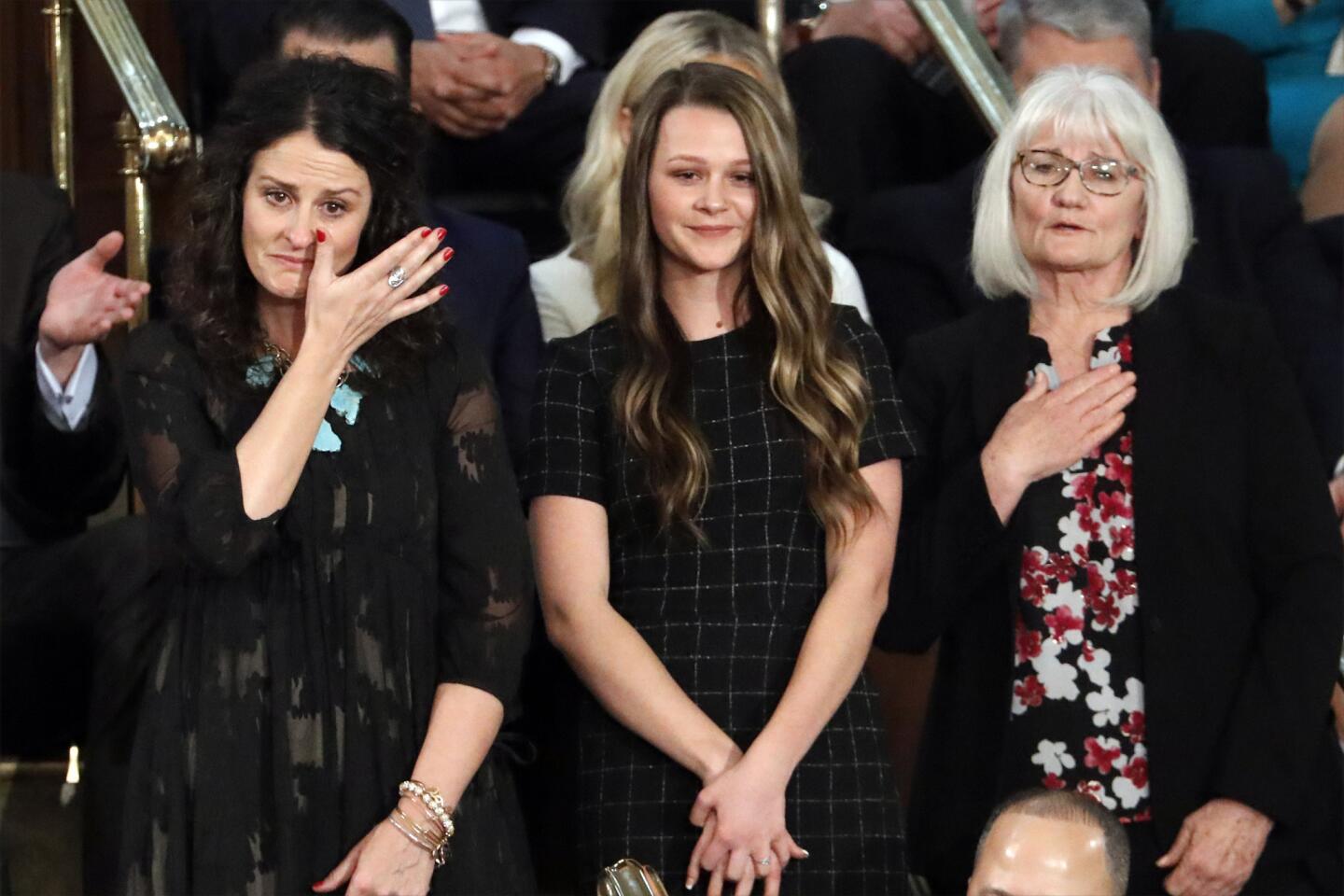Trump calls for end to ‘political stalemate,’ delivers jabs in State of the Union address
- Share via
Reporting from Washington — President Trump called on the nation to “break decades of political stalemate” in his State of the Union address Tuesday night, one delayed by the 35-day partial government shutdown he’d provoked, which exacerbated partisan divisions and put Washington’s dysfunction on vivid display.
“There is a new opportunity in American politics if only we have the courage together to seize it,” Trump said. “Victory is not winning for our party. Victory is winning for our country.”
“Together, we can break decades of political stalemate. We can bridge old divisions, heal old wounds, build new coalitions, forge new solutions, and unlock the extraordinary promise of America’s future. The decision is ours to make.”
“Tonight,” he said, “I ask you to choose greatness.”
His calls to compromise, however, were interspersed with partisan jabs. The traditional nationally televised speech came at a perilous juncture for the president: For the first time he shares power with congressional Democrats after last fall’s big House election losses, even as he faces judgment in a range of investigations into his administration, family business, campaign and even his 2016 inaugural committee.
Trump defiantly alluded to the investigations at one point, saying, “An economic miracle is taking place in the United States, and the only thing that can stop it are foolish wars, politics or ridiculous partisan investigations.”
Sitting just behind him, the president’s newly empowered Democratic opponent, House Speaker Nancy Pelosi, rolled her eyes.
The speech was one of the longest on record, at more than 80 minutes. Trump hit on a variety of topics, including criminal justice, drug prices, trade, infrastructure, healthcare, national security, curing childhood cancer and ending AIDS in America. Yet no theme seemed to bind the issues, and most of what he said was familiar, devoid of new policy details.
For all of Trump’s focus on unity and compromise, as expected he spoke longest about illegal immigration and his proposed southern border wall — his signature campaign promise, and the issue at the center of his recent standoff with Congress.
His record over his first two years as president has left Democrats as well as some Republicans skeptical of his willingness to follow through on his initiatives or to accept compromise.
Even in the days before his speech, the president repeatedly bad-mouthed the efforts of a bipartisan group of lawmakers trying to negotiate compromise border-security measures to avert another impasse with Trump over his demand for $5.7 billion to start building a border wall.
He’d also teased in advance of the address a threat to declare a national emergency on the border, to circumvent Congress altogether and divert existing funds from other purposes to wall construction. The president declined to announce such a declaration, which Republican leaders have warned against.
Trump tried to make the case that overhauling immigration was a “a moral duty,” while arguing that “no issue better illustrates the divide between America’s working class and America’s political class.”
“Wealthy politicians and donors push for open borders while living their lives behind walls and gates and guards,” he said.
Departing from his prepared remarks on a teleprompter, the president said he would like to admit legal immigrants in “the largest numbers ever” — an aspiration at odds with his proposals to dramatically curb legal immigration.
Over Trump’s shoulder in the House chamber, Pelosi looked on beside Vice President Mike Pence, dramatizing the president’s new reality that he no longer enjoys the malleable Republican majorities in both the House and Senate that allowed him to control the agenda for two years. That advantage allowed Trump some successes, including big tax cuts, but proved insufficient to fulfill his promises to repeal the Affordable Care Act, overhaul immigration laws and get billions to build a wall.
Already Pelosi has gotten the better of him, forcing his retreat in the shutdown in the first month of Democrats’ House control, proving able to keep her party aligned and mobilize public opinion. She has made clear, along with Senate Minority Leader Charles E. Schumer, a New York Democrat, that their party will continue to challenge him on immigration and other issues.
She did not introduce Trump, and he did not greet her by name.
Pelosi and dozens of congresswomen were dressed in white, the symbolic color of women’s suffrage, making for a dramatic show on the House floor of the greatly expanded number of women after November’s Democratic election gains.
Though many of them did not applaud the president, when he boasted at one point that a majority of new jobs have gone to women, the freshmen Democratic congresswomen — many elected by anti-Trump voters — rose to applaud themselves. In a rare spontaneous show of bipartisan comity, the president then congratulated them, and the audience chanted “U.S.A.!”
Stacey Abrams, who narrowly lost her bid to be elected Georgia’s governor yet emerged as a national figure, delivered the official Democratic Party response to Trump. She lambasted him for a shutdown that left 800,000 federal workers and many contractors unpaid for a month.
“Making the livelihoods of federal workers a pawn for political games is a disgrace,” Abrams said. “The shutdown was a stunt engineered by the president of the United States, one that defied every tenet of fairness and abandoned not just our people, but our values.”
Trump had suggested that the State of the Union address was an opportunity for a reset, though few expected him to change his divisive style.
Once again he proposed a national program to rebuild roads, bridges and other infrastructure, yet he did so briefly and to little response from lawmakers. Senate Majority Leader Mitch McConnell (R-Ky.) conspicuously did not applaud; many Republicans oppose the sort of big spending program that would be popular with Democrats. The House will begin hearings on infrastructure legislation on Thursday.
Trump noted efforts to lower prescription drug prices as another area of potential bipartisanship, but details remain divisive. He also promoted the revised North American Free Trade Agreement with Canada and Mexico, which requires Congress’ approval but faces some opposition in both parties.
The president also noted his administration’s efforts toward a trade accord with China, even as both countries’ negotiators have struggled to reach a deal against the backdrop of a trade war of tit-for-tat tariffs that he initiated.
Trump’s top priority — building the wall and curbing legal and illegal immigration — will perhaps be the hardest to achieve, given the gulf with Democrats and even some Republicans. Though Democrats have agreed in the past to support border fences as part of broad immigration deals, Pelosi now calls a wall “immoral.” Further hindering the president, many of his hard-line immigration allies do not see a wall as a priority.
Addressing international affairs, Trump confirmed that he would hold a second summit meeting with North Korea’s leader, Kim Jong Un, in Vietnam on Feb. 27 and 28, despite that country’s failure to begin the promised process of denuclearization.
Trump asserted that his decision to engage the once-isolated Kim has averted a nuclear catastrophe. “If I had not been elected president of the United States, we would right now, in my opinion, be in a major war with North Korea with potentially millions of people killed,” he said — prompting another eye-roll from Pelosi.
He hailed two of his recent decisions: to abandon the Reagan-era Intermediate-Range Nuclear Forces Treaty, known as the INF treaty, because of Russia’s violations, and to officially recognize Venezuelan opposition figure Juan Guaido as head of that country’s government instead of socialist President Nicolas Maduro.
Polls show Trump’s approval at about 41% on average, with more than 55% of voters disapproving of his performance. Presidents typically see their popularity rise after State of the Union addresses. Trump won a modest bump last year, but his low job approval has remained relatively stable throughout a presidency in which he has directed most of his efforts toward pleasing his core supporters.
A Gallup poll released on Monday showed that 60% of Americans oppose significant expansion of a wall along the border.
Though Trump previously had promised a less partisan tone, ahead of the speech his aides privately encouraged surrogates and allies to hammer Democrats in the media on two issues, taxes and abortion.
In the address, Trump attacked the Democratic governors of New York and Virginia for supporting laws to allow late-term abortions; the laws do so when the fetus is not viable or a mother’s life is in danger. He accused Virginia Gov. Ralph Northam of stating “he would execute a baby after birth.”
To read this article in Spanish, click here.
Follow the latest news of the Trump administration on Essential Washington »
More to Read
Get the L.A. Times Politics newsletter
Deeply reported insights into legislation, politics and policy from Sacramento, Washington and beyond. In your inbox twice per week.
You may occasionally receive promotional content from the Los Angeles Times.
